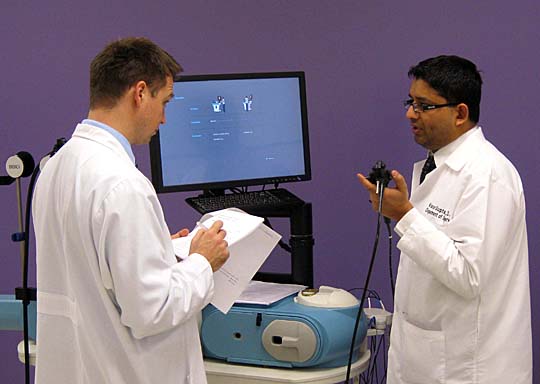Dr. Hollis W. Merrick, UT Medical Center surgeon and professor of surgery, has given a $100,000 gift to the Interprofessional Immersive Simulation Center to provide new virtual learning tours.

Dr. Raul Bosio, assistant professor and associate director of the Surgery Residency Program, left, and Dr. Barun Gupta, who recently graduated from his residency, discussed the new GI-Bronch Mentor.
“This advanced simulator offers comprehensive hands-on training for health professionals to practice procedures such as gastroscopy, colonoscopy and diagnostic bronchoscopy using virtual anatomy and physiology,” Boyers said.
The GI Mentor is a top-of-the-line endoscopic medical simulator for the training of gastrointestinal upper and lower endoscopic procedures. It offers a comprehensive library of modules with more than 120 tasks and virtual patient cases.
“The simulator provides multiple training opportunities with true-to-life patient cases offering realistic scenarios of clinical situations, ranging from simple diagnostic procedures to advanced endoscopic retrograde cholangiopancreatography procedures and endoscopic ultrasound procedures,” Boyers said.
Original colonoscope and duodenoscope have been customized to provide realistic simulation, including tactile sensations and various endoscopic tools. The GI Mentor provides an excellent environment for practicing clinical procedures in a safe and realistic manner, according to Boyers.
The purpose of the Center of Clinical Simulation is to provide education and training through the use of multiple simulation modalities, including virtual reality technology, in a safe venue in which health-care professionals can practice until they are proficient.
Boyers said the ultimate goal of simulation in health care is to constantly improve patient safety through the training of individuals and teams in simulation environments.
“This newly named lab will house advanced surgical simulation equipment for the training of future and current surgeons and other health professionals, such as physicians assistants and advanced nurse practitioners,” she said.
In recognition of his gift and to honor a lifetime of teaching surgical skills, UT has named the new facility the Hollis W. Merrick, M.D., Surgical Simulation Laboratory.